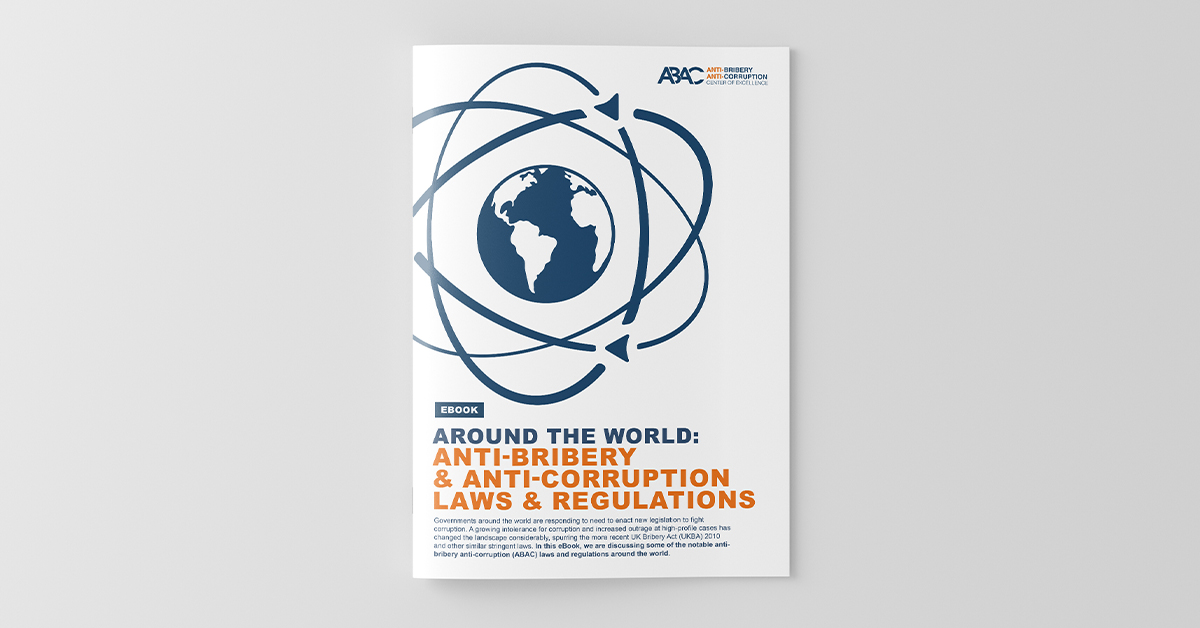Governments around the world are responding to need to enact new legislation to fight corruption. Until the last 20 years or so, most laws and regulations were relatively weak, other than the U.S. Foreign Corrupt Practices Act (FCPA). However, a growing intolerance for corruption and increased outrage at high-profile cases has changed the landscape considerably, spurring the more recent UK Bribery Act (UKBA) 2010 and other similar stringent laws. Bribery and corruption can cause extreme harm to organisations and economies, causing distrust, financial loss, criminal consequences and loss of reputation.
In this article series, we are discussing some of the notable anti-bribery anti-corruption (ABAC) laws and regulations around the world. In this article series part 1 of 3, we are discussing UNCAC, European Union Anti-Corruption Conventions and UKBA:
France – Sapin II
Sapin II entered into force in France in 2017. The anti-corruption law addresses transparency, anti-corruption and economic modernisation. Sapin II legislated new provisions, such as the requirement that organisations must implement an anti-corruption program to identify and reduce corruption risks. Under Sapin II, it is illegal to give gratuities such as gifts, donations or rewards if the intent is to gain influence, usually with a public official, to gain an unfair business advantage. Notably, it extends extra-territorial reach for French prosecutors, applying to corruption by French companies overseas and foreign companies with a footprint in France.
According to the Forbes article “Will The Sapin II Anti-Corruption Law Shepherd France Into A New Era Of Transparency?”, “The law is intended as a civil, preventive instrument and has a positive obligation on companies at its core. It does not significantly interfere with existing laws and sentencing guidelines on corruption and “traffic d’influence,” and it doesn’t require a predicate offense to kick in. In short, it looks and feels different from its UK and American counterparts in subtle but important ways.”
If you don’t have the time and you are interested in more in-depth information just download our new ABAC Laws and Regulations Around the World Playbook now! Our Playbook goes into each of the laws and regulations and discusses the importance, mechanisms and action points to each.
The United Nations Convention against Corruption (UNCAC)
The United Nations Convention against Corruption (UNCAC) entered into force in 2005. According to the United Nations: UNCAC is “the only legally binding universal anti-corruption instrument. The Convention’s far-reaching approach and the mandatory character of many of its provisions make it a unique tool for developing a comprehensive response to a global problem.”
“The Convention covers five main areas: preventive measures, criminalisation and law enforcement, international cooperation, asset recovery, and technical assistance and information exchange. The Convention covers many different forms of corruption, such as bribery, trading in influence, abuse of functions, and various acts of corruption in the private sector. A highlight of the Convention is the inclusion of a specific chapter on asset recovery, aimed at returning assets to their rightful owners, including countries from which they had been taken illicitly. The vast majority of United Nations Member States are parties to the Convention.”
European Union Anti-Corruption Conventions
Several anti-corruption conventions have entered into force for European Union (EU) member nations. These include the Council of Europe Criminal Law Convention on Corruption (COE Criminal Law Convention), the Council of Europe Civil Law Convention on Corruption (COE Civil Law Convention), the European Union Convention against Corruption Involving Officials (EU Convention against Corruption), and the European Union Convention on the Protection of the European Communities’ Financial Interests (EU Convention on Financial Interests).
United Kingdom – UK Bribery Act (UKBA) 2010
The UK Bribery Act 2010 replaced previous common law provisions against bribery. Its passage effectively codified the crimes of bribery and corruption, including the bribery of foreign officials and, notably, the negligence and failure of an entity to prevent bribery on its behalf. UKBA also dictates strict penalties for violations of bribery and corruption, including a maximum 10 years imprisonment, unlimited fines, and allowing for the confiscation of property deemed as proceeds of a crime, according to legislation.gov.uk.
The UKBA has a broad scope. An individual or organisation anywhere in the world can be prosecuted if they are alleged to have committed the crime of bribery or corruption, and have links to the United Kingdom. It’s considered one of the strictest anti-bribery measures in the world.
Stay connected for our part two and three of this three-part article series or to know more about local and regional compliance or anti-bribery and anti-corruption laws and regulations by signing up to our newsletter!
About ABAC® Center of Excellence
ABAC® is an independent certification body powered by CRI Group. ABAC® Center of Excellence offers a complete suite of services and solutions designed to educate, equip & support the world’s leading business organisations with the latest best-in-practice risk & performance assessments, systems improvement & standards certification. ABAC® programs protect your organisation from damaging litigation & safeguard your business in the global marketplace by providing certification & training in internationally recognised ISO standards, such as ISO 37001 Anti-Bribery Management Systems, ISO 37301 Compliance Management Systems and ISO 31000 Risk Management Systems.
GET A FREE QUOTE or CONTACT US to discuss your anti-bribery, risk and compliance needs.




[…] part 1 of this series, we discussed ABAC laws and regulations, including The United Nations Convention against Corruption […]